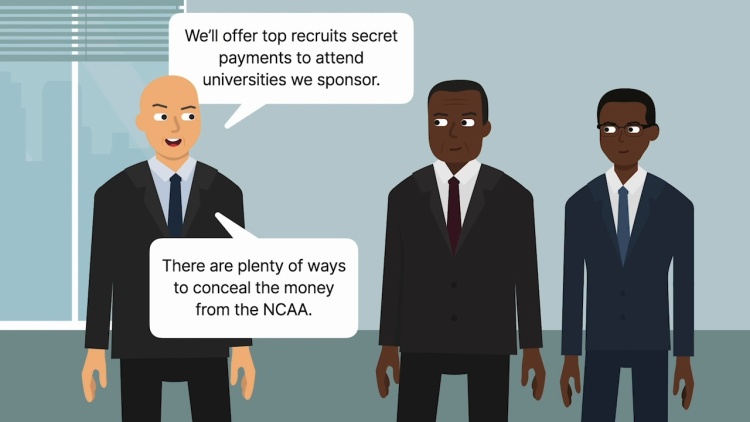United States v. Gatto
United States Court of Appeals for the Second Circuit
986 F.3d 104 (2021)
- Written by Robert Cane, JD
Facts
The National Collegiate Athletic Association (NCAA) requires that student-athletes remain unpaid amateurs to maintain their NCAA eligibility. James Gatto (defendant) was Adidas’s marketing director for basketball. Gatto worked with Merl Code (defendant), an Adidas consultant, and Christian Dawkins (defendant), an aspiring sports agent, to provide payments to high-school basketball players in exchange for promises to attend certain universities. Such payments violated the NCAA amateurism rules, so the three men enacted schemes to conceal the payments. The schemes spanned several years. Part of the schemes required the student-athletes to provide eligibility certifications to the universities indicating that they had complied with NCAA rules regarding payments to recruits. As a result of the schemes, certain recruits received financial aid to attend NCAA schools even though they were technically ineligible because of the payments from Gatto and his associates. The government (plaintiff) charged Gatto, Code, and Dawkins with wire fraud and conspiracy to commit wire fraud. During trial, Gatto, Code, and Dawkins denied knowledge that recruits had to falsify eligibility certificates and argued that their lack of knowledge precluded a wire-fraud conviction. However, the prosecution presented ample evidence showing that the men knew that recruits had to misrepresent their eligibility as part of the schemes. The trial court instructed the jury on the doctrine of conscious avoidance in the jury charge. A jury found all three men guilty. Gatto, Code, and Dawkins appealed, arguing that the conscious-avoidance jury instruction was erroneous.
Rule of Law
Issue
Holding and Reasoning (Chin, J.)
What to do next…
Here's why 911,000 law students have relied on our case briefs:
- Written by law professors and practitioners, not other law students. 47,100 briefs, keyed to 997 casebooks. Top-notch customer support.
- The right amount of information, includes the facts, issues, rule of law, holding and reasoning, and any concurrences and dissents.
- Access in your classes, works on your mobile and tablet. Massive library of related video lessons and high quality multiple-choice questions.
- Easy to use, uniform format for every case brief. Written in plain English, not in legalese. Our briefs summarize and simplify; they don’t just repeat the court’s language.





